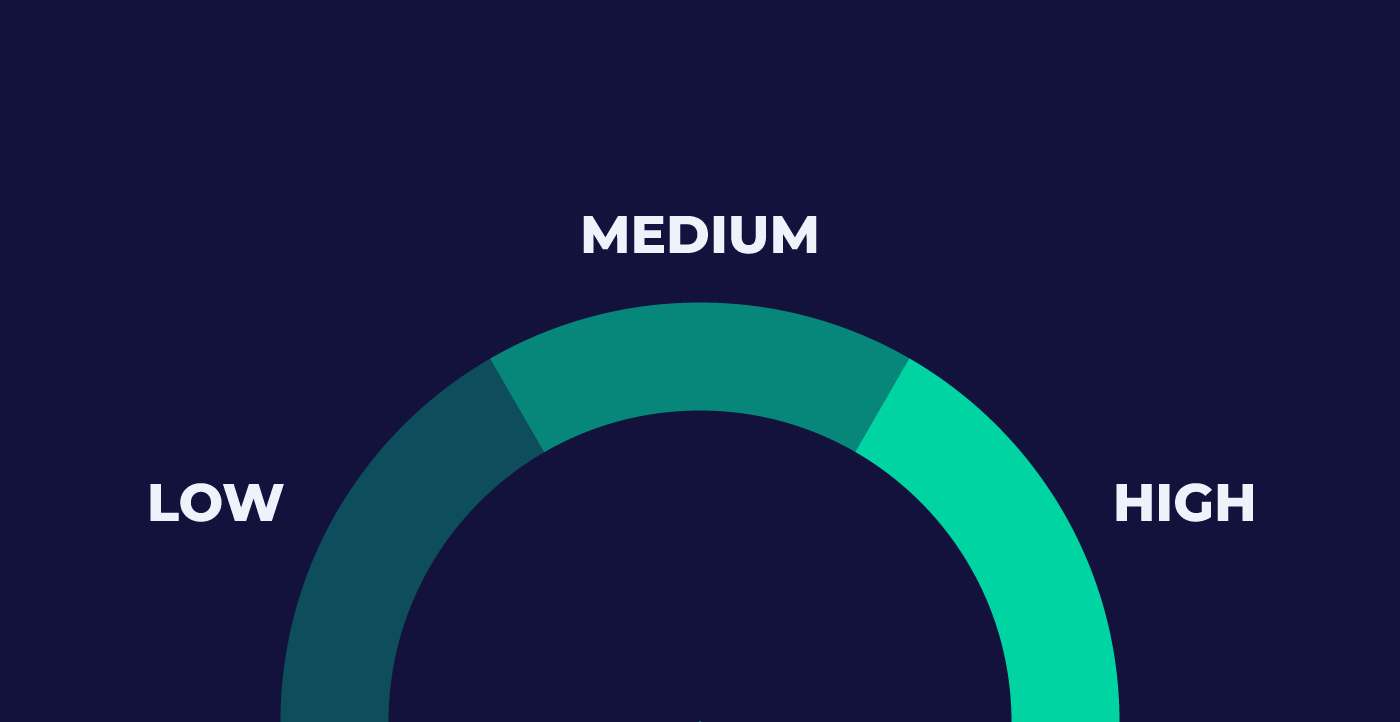What’s your risk tolerance? Take the quiz to find out!

If you’re new to investing, it can be tough to gauge your risk tolerance — especially if you started investing post-2008 financial crisis. After all, risk tolerance is defined as an investor’s ability and willingness to withstand volatility in the stock market, and we’ve been in a bull market for a whopping nine years. With share prices rising pretty steadily for nearly a decade — that’s a 18,000-point increase in the Dow Jones and a 2,000-point increase in the S&P 500 — young investors have largely avoided significant dips in the market.
For investors who have never weathered a market downturn before, it’s difficult to pinpoint exactly how you will likely react the next time markets take a dive. After all, risk tolerance is more about how you react to the negative, not the positive. Of course we all would love to pursue greater returns. The question is: how much are we willing to put on the line to do it? And how much will our emotions rule our decisions if and when our account value plummets?
In times of trouble, those with a high risk tolerance will soldier on with the knowledge that markets will eventually move up and to the right once again. Those with a low risk tolerance will likely panic and sell all or a majority of their assets.
In times like these, of course, it’s easy to assume you fall into the camp of the former. It’s easy to keep a level head when times are good and markets are calm. But the fact of the matter is, when a recession hits or a bubble bursts, everyone tends to think this time is different.
That’s why it’s important to get an accurate pulse on your true risk tolerance. After all, a higher risk portfolio will likely experience higher returns in a rising market, but it will also most likely fall more dramatically when the market dips.
Say you inaccurately assume you have a high risk tolerance and assemble your investment portfolio accordingly. But when a market downturn hits, you panic and sell a majority of your holdings. At this point, your loss may be much greater than if your asset allocation leaned toward the more conservative side of the spectrum.
A more conservative portfolio will also likely dilute the bumps you experience over the entire life of your investments, lessening the chance that your emotions will take a negative toll on your financial decisions.
With that in mind, waiting for a major market downturn to see what happens isn’t really an option for gauging your risk tolerance. That’s why we put together this list of questions to give you a pretty good idea of where you stand:
Part 1: The Logistics
1. How long do you plan to hold your investments? (this is your investment horizon)
a. Less than 3 years
b. 3 to 10 years
c. 10+ years
2. Subtract your current age from the age at which you plan to retire. What do you get?
a. Less than 10
b. 11-25
c. More than 25
3. How much investing experience do you have?
a. Limited
b. Moderate
c. Advanced
4. What is your net worth?
a. Less than $75k
b. $75k to $400k
c. $400k+
5. Say you lose your job next week. How long could your emergency fund keep you afloat?
a. What emergency fund?
b. 3 to 6 months
c. 6 months or more
Part 2: Behavior
6. Which offer would you rather take?
a. A guarantee of $100.
b. A 50% chance of winning $500.
c. A 5% chance of winning $1,500.
7. You unexpectedly received $25,000 to invest. Now what?
a. Deposit it in a bank account, money market account, or an insured CD
b. Invest it in safe, high-quality bonds or bond ETFs
c. Invest it in stocks or stock ETFs
8. You’ve just taken a job at a small fast-growing company. After your first year you are offered the following bonus choices. Which one would you choose?
a. A five-year employment contract
b. A $25,000 bonus
c. Stock in the company currently worth $25,000 with the hope of selling out later at a large profit
9. If you woke up tomorrow morning and your holdings were down 25%, what would be your immediate reaction?
a. Withdraw the money
b. Continue investing but make some adjustments to my portfolio
c. See it as a buying opportunity
10. You inherit a mortgage-free house worth $160,000. The house is in a nice neighborhood, and you believe that it should increase in value faster than inflation. Unfortunately, the house needs repairs. If rented today, the house would bring in $1,200 monthly, but if updates and repairs were made, the house would rent for $1,600 per month. To finance the repairs, you’ll need to take out a mortgage on the property.[1] You would:
a. Sell the house
b. Rent the house as is
c. Remodel and update the house, and then rent it
Mostly a’s: You are a conservative investor. While you want to build wealth and grow your nest egg, your first priority is protecting your money. You are likely uncomfortable taking risks and prefer to structure your portfolio to minimize loss rather than maximize gains. You may want to invest a larger percent of your portfolio in historically stable securities such as bonds and bond ETFs.
Mostly b’s: You are a moderate investor. You take a balanced approach to building your portfolio, weighing possibility for risk and reward evenly. While you feel comfortable investing in stocks and funds, you prefer a diversified portfolio to minimize overall risk.
Mostly c’s: You are an aggressive investor. While others see a market downturn as reason to panic, you see it as a buying opportunity. You likely have more experience with the stock market and feel relatively comfortable picking your own stocks. Your asset allocation will likely skew in favor of higher-risk securities such as growth stocks.
Want to invest for your risk tolerance? Check out M1 model portfolios to get started.
Of course, you never really know until you live it. If you are relatively new to investing or have never invested through a recession or market crash before, consider talking to others who have. Anyone investing for 20 years or more has lived through market crashes in both 2001 and 2008, and maybe even a few before that. As much as it can be useful to consider hypothetical situations to get a pulse on your risk tolerance, nothing compares to hearing real, human stories. So talk to a parent, a grandparent, a mentor — having real conversations can be the best way to learn.
- Categories
- Invest



